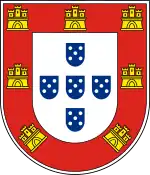Immigration to Portugal
As of 2021, Portugal had 1,198,793 inhabitants that were born in a foreign country, out of 10,467,366 inhabitants, accounting for 11.5% of its total population.[1][2]
| Year | Pop. | ±% |
|---|---|---|
| 1864 | 4,188,419 | — |
| 1878 | 4,550,699 | +8.6% |
| 1890 | 5,049,729 | +11.0% |
| 1911 | 5,969,056 | +18.2% |
| 1920 | 6,032,991 | +1.1% |
| 1930 | 6,825,883 | +13.1% |
| 1940 | 7,722,152 | +13.1% |
| 1950 | 8,510,240 | +10.2% |
| 1960 | 8,851,240 | +4.0% |
| 1970 | 8,648,369 | −2.3% |
| 1981 | 9,833,041 | +13.7% |
| 1991 | 9,862,540 | +0.3% |
| 2001 | 10,356,117 | +5.0% |
| 2011 | 10,561,614 | +2.0% |
| 2021 | 10,344,802 | −2.1% |
| 2022 | 10,467,366 | +1.2% |
| Source: INE | ||
Dealing with foreign nationals (inhabitants without Portuguese citizenship, regardless of their country of birth or ethnic background) in 2019 there were above 590,000 foreigners in Portugal. With the COVID-19 pandemic, that number went up to 661,000 at the end of 2020.[3] By 2023 their number had soared to 781,915 people.[4] These figures do not include naturalized foreign-born residents (about 342,458 resident foreigners acquired Portuguese citizenship from 2008 to 2022, of whom 20,844 did so in 2022[5][6][7]) as well as illegal immigrants, the so-called imigrantes irregulares, whose numbers, difficult to determine, are thought to be at least 300,000.[8][9][10][11]
Of the 781,915 legal residents not holding Portuguese citizenship living in Portugal in 2023, 409,523 identified as male (52.37%), and 372,392 as female (47.63%).[4]
Immigrants in Portugal largely come from Latin America, Eastern Europe, Lusophone nations in Africa, and South Asia.
Major groups of immigrants to Portugal include Brazilians, Ukrainians, Moldovans, Americans, Romanians, Russians, Chinese, Venezuelans, Angolans, Bissau-Guineans, Nepalis, Indians, Cape Verdeans, and São Toméans.
The distribution of foreigners is largely uneven in Portugal: in 2023, 65% of foreign citizens lived in Lisbon, Faro or Setúbal districts: these districts account for 35% of the country's population.[12]
Brazilians made up the largest foreign community in the country (239,744) followed by Britons (45,265) and Cape Verdeans (36,748).[4] The fourth largest, but the fastest growing, community of foreign residents in Portugal was represented by Indians; as of 2023 there were 35,416 foreigners holding Indian citizenship, a 626% increase since 2012.[13] It is worth noting that almost 9,000 Indians living in Portugal have acquired Portuguese citizenship since 2012: more than the number of Indians living in the country in 2012.[6] The majority of Indians living in Portugal are from the former Portuguese colony of Goa or from Gujarat.[14][15]
As of 2023, foreign citizens' origins were subdivided as follows: Europe (33.5%), America (33.1%), Asia (17.3%), Africa (16%) and Oceania (0.1%).[4]
The share of children born in Portugal to foreign resident mothers stood at 10.3% in 2011, 9.7% in 2017 and 16.7% in 2022.[16][17][18]
History
Portugal, for long a country of emigration, has become a meeting country of net immigration, and not just from the last Portuguese overseas territories in India (until 1961), Africa (until 1975), and Far East Asia (until 1999).
Retornados, return migration and first immigrant communities: 1961–1989

In 1954, India annexed the Portuguese territory of Dadra and Nagar Haveli and, in 1961, Daman and Diu and Goa. In the same year, the authorities of the newly independent Benin expelled the small Portuguese garrison holding the Fort of São João Baptista de Ajudá, in Ouidah. Some people, especially white Portuguese settlers and people of mixed Portuguese descent, started migrating towards Portugal immediately after these events.
_straatbeelde%252C_Bestanddeelnr_254-9572.jpg.webp)
A major immigrant influx was recorded starting in 1974, when over a million Portuguese citizens from Portugal's African territories (mostly from Angola and Mozambique) migrated to Portugal.[19] They are known and are still referred as retornados (meaning "those who came back") — Portuguese settlers and descendants of Portuguese (or other European such as Germans or Italians) settlers born in former African colonies who relocated to Portugal after their independence and in the first half of the 1980s.
Along with white retornados there were also some Black people, whose immigration process towards Portugal became visible especially after the Portuguese economic growth of the second half of the 1980s.
One of the primary settlement areas for Black communities, especially the Cape Verdean one, in Portugal was the lands north of Lisbon, near the present-day parish of Benfica. Starting from the 1970s, numerous clandestine neighborhoods (bairros clandestinos).[20][21]
A country of immigration: 1990–2007


Immigration to Portugal, historically low, soared after the country's accession to the EU in 1986 and increased significantly starting in the late 1990s, also under form of human trafficking.[22][23]
Since the 1990s, along with a boom in construction, several waves of Ukrainian, Brazilian, people from the former Portuguese colonies in Africa and other Africans have settled in the country.
Those communities currently make up the largest share of immigrants in Portugal and many have since acquired Portuguese citizenship. Romanians, Moldovans, Chinese and Indians also started to choose Portugal as a destination starting in the late 1990s and early 2000s.
Financial crisis and economic recession: 2008–2013
%252C_2011._(6237732507).jpg.webp)
Immigration to Portugal decreased significantly after the dire consequences of the 2008 financial crisis. At the same time, emigration of both Portuguese and foreign nationals increased.
.JPG.webp)
Between 2008 and 2013 unemployment rate in Portugal rose from 7.6% to 17.1%[24] and 2013 GDP was 7.60% lower than the value recorded for 2007 GDP.[25] Moreover, between 2007 and 2013 there was a 10.35% inflation rate, meaning that the Purchasing power of Portuguese families decreased significantly.[26]
From 2008 to 2013, around 412,000 people left the country (51.2% did so permanently).[27] Of those who left the country 5.47% (22,547 people) were foreigners and 65.3% of the foreigners doing so left the country permanently. This means that 3.9% of the 2008 population left the country in just 6 years.
In fact, Portugal reached its historical population peak in 2009 when 10,573,479 people lived in the country: this value decreased to 10,395,121 people (−1.7%) at the end of 2013, due to the combined effect of increased emigration, decreasing immigration and population ageing.[28]
It is significant to highlight that only 140,845 people immigrated to Portugal between 2008 and 2013 meaning that the country experienced a net migration loss of around −271,000. In particular, in 2012 less than 15,000 immigrants settled in Portugal.[29]
With the ease of the economic crisis and increase in tourism and industrial production, immigration increased again after 2013.
Economic recovery, Golden visa, EU pensioners and Sephardi Jews: 2014–2019
Following the recovery of the Portuguese economy starting in 2014, immigration to Portugal increased once again and emigration decreased by 42.8% from 2014 to 2019 while immigration increased by 413%[29]
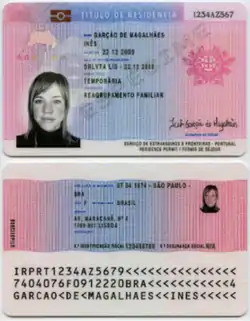
Between 2013 and 2019 unemployment rate in Portugal fell from 17.1% to 6.6%[24] and 2019 GDP was 14.35% higher than the value recorded for 2013 GDP. It is also worth noting that the value recorded for 2019 GDP was 5.71% higher than the one recorded in 2007: Portugal officially recovered from the Financial crisis and the troika austerity measures in 2017.[25]

Moreover, between 2014 and 2019 the increase in prices was modest (the country recorded a 3.54% inflation rate), meaning that the Purchasing power of Portuguese families increased significantly.[26]
During these years, almost 573,000 people left the country: despite Portugal's reputation as an economic success story since the financial crisis, many young, educated workers are still more attracted by significantly higher wages in countries such as the United Kingdom, France or Switzerland.[30] On the other hand, it is significant to note that the share of those leaving permanently fell to 38.4%, meaning that high skilled workers are, after 2013, more willing to come back to Portugal after having acquired some years of experience, typically in Northern European countries.[27] As a measure to revert skill-drain, population decrease and ageing, the government has since created new measures to attract Portuguese emigrants to return home.[31]
Of those who left the country 3.96% (22,685 people) were foreigners but only 31.4% of them left the country permanently. This means that 5.5% of the 2013 population left the country in just 6 years but 61.6% did so temporarily.[28] After 2014 the country's population decline rate started to slow and the population fell to 10,333,496 people in 2018, mostly due to population ageing: by the end of 2019 though, due increasing immigration, Portugal's population had recovered the value recorded in 2014 (around 10,395,000).[28]

It is significant to highlight that around 295,000 people immigrated to Portugal between 2014 and 2019. In particular, 51.1% of those who settled in Portugal in this period did so between 2018 and 2019.[29] The surge in immigration was due to the good economic conditions of the country, to the crisis in Brazil (the primary source of immigration in Portugal) and to numerous programs devised during the years of the 2008–2013 crisis aimed at attracting foreign capitals: these include the Non-habitual residency (NHR) taxation law (2009), the Portuguese Golden Visa law (2012), and the Sephardi Nationality Act (2015).

The Portuguese government has not only developed strategies aiming at calling back Portuguese emigrants but also at attracting foreign citizens.
It is with this goal that the Golden visa law was devised in 2012, it is an immigrant investor program by the government of Portugal that granted residency in Portugal to people who invested in properties worth at least €500,000 or created 10 jobs in Portugal.[32] As of May 2023 the program has resulted in 32,025 residence permits granted, of which 38% to investors and 62% to their family members. 43.8% of the investors who have benefited from the program came from China, other significant countries include Brazil (9.96%), the US (5.45%), Turkey (4.73%) and South Africa (4.45%). Around 6.3 billion euros (€) were invested in the acquisition of 11,067 real estate properties (for a mean value of 567,736 €), but only 22 jobs were created.[33] In addition, around 795 million euros (€) were transferred to Portugal.[34] Due to the overwhelming majority of Golden visas being issued because of investments solely and exclusively dedicated to real estate and there being a very low investment in job creation and other activities, the program has been cancelled in July 2023.[35][36]

Another program, devised in 2009 and that has attracted foreigners has been the special tributary regime that grants to certain categories of new residents a flat tax and protects them from double taxation.[37] Many pensioners, especially from Northern European countries such as Germany, the Netherlands, Belgium, Sweden, Finland and Norway have taken advantage of the law and moved to Portugal. Due to increased pressure from the countries of origin of the retirees as well as from the local Portuguese population (subject to a different taxation system) the program was drastically changed.[38][39][40][41][42] Nevertheless, pensioners continue coming to Portugal thanks to the high quality of life, Mediterranean climate and sunny weather.

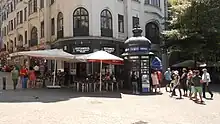
Another immigrant category includes the descendants of Portuguese Jews expelled in 1496. In 2015 the Portuguese parliament officially acknowledged the expulsion as unrightful. To try to make up for the past mistakes, the government passed a law known as "Law of Return".[43] The law aims to right the historic wrongs of the Portuguese Inquisition, which resulted in the expulsion or forced conversion of thousands of Jews from Portugal in the 15th and 16th centuries. The law grants citizenship to any descendants of those persecuted Jews who can prove their Sephardic Jewish ancestry and a "connection" to Portugal. It is intended to provide a measure of justice and recognition to those whose families suffered from discrimination and persecution centuries ago.[44][45][46][47] Since 2015, more than 140,000 people from 60 countries (mostly from Israel or Turkey) applied to Portuguese citizenship in virtue of them being of Sephardic descent.[48][49][50][51] Despite the good intentions of the law, some doubts arose over the legitimate attribution of Portuguese citizenship after it was revealed that people such as Russian oligarch Roman Abramovich were Portuguese – thus EU – citizens under the new law. Due to the controversies and the recent judicial investigations the law will come to an end starting in January 2024.[52][53][54][55][56][57]
COVID-19 pandemic and increase in immigration: 2020–present

Immigration to Portugal has steadily increased in the last years. At the beginning of 2020 there were 590,348 foreigners living in the country, their number increased to 662,095 during 2020, to 698,887 during 2021 and up to 781,915 at the beginning of 2023. This means that the relative incidence of foreigners has increased from 5.7% to 7.5% in just 3 years. From December 2019 to December 2022 the number of foreigners increased by 32.4%.

Some immigrant communities, like those arrived from Africa and South America, are growing as a result of economic migration – foreigners looking for better economic conditions abroad. The outlook of the economy of Portugal is good, unemployment remains stable and in line with the rest of the EU. In fact, since 2018 Portugal has recorded a lower unemployment rate than that recorded in both the Eurozone and the EU as a whole. For instance, in 2022 the unemployment rate in Portugal stood at 6%, while for the EU and the Eurozone the recorded values were respectively 6.2% and 6.8%.[24][58] In addition, despite suffering during the COVID-19 pandemic, the GDP recorded for 2022 was 3.22% higher than in 2019.[25]

Other immigrant communities, like most of those arrived from other EU member states, are a result of the attractiveness of the country for high income foreign citizens looking for a better quality of life, a warmer sunny weather, security and exquisite cuisine.
From 2020 to 2022 around 205,909 people emigrated from Portugal, continuing the decrease in emigration recorded since 2014. This means that 2.0% of the 2019 population left the country in the last 3 years but 60.2% did so temporarily.[28] Moreover, it is worth noting that almost 300,000 people entered the country since 2019, a sharp increase and the largest influx of immigrants ever recorded in Portugal since the 1980s.[29]
It is expected that the number of foreigners will further increase in the next few years: in early 2023, Portugal regularized around 113,000 CPLP citizens residing illegally in the country.[59][60] In total, around 300,000 foreigners who live illegally in Portugal are awaiting regularization.[11]
Number of foreign residents
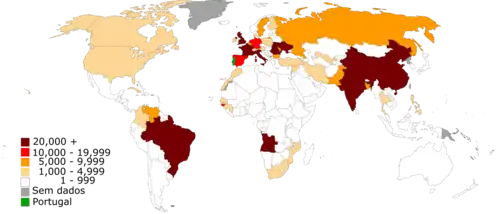
Brazilians are the most prevalent foreign nationality. The 239,744 resident Brazilians represent 2.29% of the total population. Other significant foreign communities (excluding naturalized citizens) are the ones from other countries of the Lusosphere. In 2023 there were 110,517 from PALOP countries (Equatorial Guinea, Guinea-Bissau, São Tomé and Principe, Angola, Mozambique, Cape Verde) as well as from Timor-Leste and Macau, corresponding to 1.06% of the total population.[4]
In addition, there is a thriving community of people from the Indian subcontinent (chiefly Indians and Nepalis) adding up to 86,698 people or 0.83% of total population.
A number of EU citizens have also chosen Portugal as a destination, with the majority being part of the British, Italian, French, German, Spanish, Dutch, Belgian or Swedish communities. These communities are mostly composed of persons looking for quality of life and include an increasing number of pensioners.


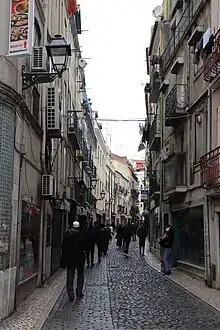
.jpg.webp)
_(12131354684).jpg.webp)
.jpg.webp)

| N° | Country of citizenship | Number of foreign citizens in 2023[4] |
|---|---|---|
| 1 | 239,744 | |
| 2 | 45,265 | |
| 3 | 36,748 | |
| 4 | 35,416 | |
| 5 | 34,039 | |
| 6 | 31,761 | |
| 7 | 27,512 | |
| 8 | 25,445 | |
| 9 | 23,839 | |
| 10 | 23,737 | |
| 11 | 23,393 | |
| 12 | 22,230 | |
| 13 | 20,500 | |
| 14 | 19,508 | |
| 15 | 16,468 | |
| 16 | 13,077 | |
| 17 | 12,066 | |
| 18 | 10,828 | |
| 19 | 9,794 | |
| 20 | 8,936 | |
| 21 | 6,088 | |
| 22 | 6,075 | |
| 23 | 5,653 | |
| 24 | 5,243 | |
| 25 | 5,139 | |
| 26 | 4,785 | |
| 27 | 4,326 | |
| 28 | 4,159 | |
| 29 | 3,501 | |
| 30 | 2,575 | |
| 31 | 2,162 | |
| 32 | 2,135 | |
| 33 | 2,014 | |
| 34 | 1,977 | |
| 35 | 1,797 | |
| 36 | 1,673 |
Evolution of the number of foreign residents
The following table shows the evolution of the number of foreigners whose residence is legally registered in Portugal since 2008. The table considers the most frequent foreign nationalities found in the country and deals with foreigners only, thus excluding those who have acquired Portuguese citizenship, their descendants and people with migrant background.[66]
| Country | 2008[67][68] | 2009[69][68] | 2010[70][68] | 2011[71][68] | 2012[72][68] | 2013[73][68] | 2014[74][68] | 2015[75][68] | 2016[76][68] | 2017[77][68] | 2018[78][68] | 2019[79][68] | 2020[80][68] | 2021[81][68] | 2022[82][68] | 2023[4][68] |
|---|---|---|---|---|---|---|---|---|---|---|---|---|---|---|---|---|
| 70,132 | ||||||||||||||||
| 23,574 | ||||||||||||||||
| 64,667 | ||||||||||||||||
| 4,401 | ||||||||||||||||
| 5,994 | ||||||||||||||||
| 32,819 | ||||||||||||||||
| 10,540 | ||||||||||||||||
| 39,606 | ||||||||||||||||
| 314 | ||||||||||||||||
| 25,039 | ||||||||||||||||
| 19,280 | ||||||||||||||||
| 10,982 | ||||||||||||||||
| 15,493 | ||||||||||||||||
| 18,031 | ||||||||||||||||
| 1,193 | ||||||||||||||||
| 11,015 | ||||||||||||||||
| 6,598 | ||||||||||||||||
| 2,383 | ||||||||||||||||
| 8,733 | ||||||||||||||||
| 3,740 | ||||||||||||||||
| 3,101 | ||||||||||||||||
| 5,674 | ||||||||||||||||
| 1,655 | ||||||||||||||||
| 14,813 | ||||||||||||||||
| 5,076 | ||||||||||||||||
| 5,954 | ||||||||||||||||
| 913 | ||||||||||||||||
| 887 | ||||||||||||||||
| 1,842 | ||||||||||||||||
| 1,928 | ||||||||||||||||
| 2,116 | ||||||||||||||||
| 675 | ||||||||||||||||
| 1,966 | ||||||||||||||||
| 193 | ||||||||||||||||
| 632 | ||||||||||||||||
| 827 | ||||||||||||||||
| 1,992 | ||||||||||||||||
| 1,075 | ||||||||||||||||
| 731 | ||||||||||||||||
| 310 | ||||||||||||||||
| 604 | ||||||||||||||||
| 386 | ||||||||||||||||
| 702 | ||||||||||||||||
| 496 | ||||||||||||||||
| 96 | ||||||||||||||||
| 1,847 | ||||||||||||||||
| 834 | ||||||||||||||||
| 717 | ||||||||||||||||
| 354 | ||||||||||||||||
| 231 | ||||||||||||||||
| 430 | ||||||||||||||||
| 252 | ||||||||||||||||
| 38 | ||||||||||||||||
| 363 | ||||||||||||||||
| 5 | ||||||||||||||||
| 598 | ||||||||||||||||
| 193 | ||||||||||||||||
| 313 | ||||||||||||||||
| 782 | ||||||||||||||||
| 124 | ||||||||||||||||
| 544 | ||||||||||||||||
| 358 | ||||||||||||||||
| 325 | ||||||||||||||||
| 427 | ||||||||||||||||
| 165 | ||||||||||||||||
| 206 | ||||||||||||||||
| 301 | ||||||||||||||||
| 137 | ||||||||||||||||
| 976 | ||||||||||||||||
| 157 | ||||||||||||||||
| 187 | ||||||||||||||||
| 868 | ||||||||||||||||
| 15 | ||||||||||||||||
| 154 | ||||||||||||||||
| 90 | ||||||||||||||||
| 86 | ||||||||||||||||
| 86 | ||||||||||||||||
| 92 | ||||||||||||||||
| 380 | ||||||||||||||||
| 79 | ||||||||||||||||
| 57 | ||||||||||||||||
| 425 | ||||||||||||||||
| 263 | ||||||||||||||||
| 154 | ||||||||||||||||
| 202 | ||||||||||||||||
| 157 | ||||||||||||||||
| 92 | ||||||||||||||||
| 0 | ||||||||||||||||
| 16 | ||||||||||||||||
| 3 | ||||||||||||||||
| 47 | ||||||||||||||||
| 68 | ||||||||||||||||
| 99 | ||||||||||||||||
| 115 | ||||||||||||||||
| 79 | ||||||||||||||||
| 14 | ||||||||||||||||
| 3 | ||||||||||||||||
| 54 | ||||||||||||||||
| 59 | ||||||||||||||||
| 311 | ||||||||||||||||
| 46 | ||||||||||||||||
| 22 | ||||||||||||||||
| 60 | ||||||||||||||||
| 61 | ||||||||||||||||
| 35 | ||||||||||||||||
| 38 | ||||||||||||||||
| 92 | ||||||||||||||||
| 134 | ||||||||||||||||
| 115 | ||||||||||||||||
| 17 | ||||||||||||||||
| 0 | ||||||||||||||||
| 1 | ||||||||||||||||
| 22 | ||||||||||||||||
| 10 | ||||||||||||||||
| 55 | ||||||||||||||||
| 51 | ||||||||||||||||
| 23 | ||||||||||||||||
| 17 | ||||||||||||||||
| 127 | ||||||||||||||||
| 13 | ||||||||||||||||
| 23 | ||||||||||||||||
| 8 | ||||||||||||||||
| 2 | ||||||||||||||||
| 335 | ||||||||||||||||
| 0 | ||||||||||||||||
| 14 | ||||||||||||||||
| 33 | ||||||||||||||||
| 10 | ||||||||||||||||
| 3 | ||||||||||||||||
| 13 | ||||||||||||||||
| 49 | ||||||||||||||||
| 2 | ||||||||||||||||
| 8 | ||||||||||||||||
| 33 | ||||||||||||||||
| 14 | ||||||||||||||||
| 53 | ||||||||||||||||
| 12 | ||||||||||||||||
| 0 | ||||||||||||||||
| 19 | ||||||||||||||||
| 4 | ||||||||||||||||
| Other countries (below 25) | 649 | |||||||||||||||
| Total foreigners | 446,333 | |||||||||||||||
| Share of the population[83] | 4.23% |
The following table deals with the number of foreigners from selected communities in selected years, as well as their relative growth during specific timespans.
| The 20 largest legal immigrant communities in 2007 compared with their numbers in 1999 *: European Union citizenship P: Portuguese speaking | ||||||||||
| Legal foreign residents | Number in 1999 | 2001 | 2002[86][87] | 2004[88][89] | 2006[90] | 2007 | Growth in percentage(1999–2007) | 2011[84] | % (2011)[84] | change
2001–2011[84] |
|---|---|---|---|---|---|---|---|---|---|---|
| BraziliansP | 20,851 | 31,869 | 58,370 | 66,907 | 73,384 | 66,354 | + 218% | 109,787 | 27.8% | +244.5% |
| CapeverdeansP | 43,951 | 33,145 | 59,678 | 64,164 | 68,145 | 63,925 | + 45% | 38,895 | 9.9% | +17.3% |
| AngolansP | 17,721 | 37,014 | 31,332 | 35,264 | 33,215 | 32,728 | + 85% | 26,954 | 6.8% | −27.2% |
| Guineans-BissauP | 14,217 | 15,824 | 22,855 | 25,148 | 24,513 | 23,733 | + 67% | 16,360 | 4.1% | +3.4% |
| SantomeansP | 4,809 | 8,517 | 8,951 | 10,483 | 10,761 | 10,627 | + 121% | 10,408 | 2.6% | +22.2% |
| MozambicansP | 4,502 | 4,749 | 5,312 | 5,471 | 5,854 | 5,681 | + 26% | 3,028 | ||
| Ukrainians | 123 | 10,793 | 60,571 | 66,227 | 41,870 | 39,480 | + 31998% | 33,790 | 8.6% | +213.1% |
| Romanians* | 224 | 2,661 | 10,673 | 12,155 | 10,299 | 19,155 | + 8451% | 24,356 | 6.2% | +815.3% |
| Spanish* | 11,122 | 9,047 | 14,587 | 15,916 | 16,597 | 18,030 | + 62% | 10,486 | 2.7% | +15.9% |
| British* | 13,335 | 8,227 | 15,899 | 18,005 | 19,592 | 23,608 | + 77% | 15,774 | 4.0% | +91.7% |
| Moldovans | 3 | 2,984 | 11,817 | 13,689 | 12,673 | 14,053 | + 468333% | 10,475 | 2.7% | +251.0% |
| Russians | 448 | 597 | 8,211 | 1,158 | 4,945 | 5,114 | + 1042% | 4,878 | ||
| French* | 6,499 | 15,359 | 8,364 | 9,312 | 9,733 | 10,556 | + 62% | 14,360 | 3.6% | −6.5% |
| MacaneseP | 2,762 | 2,176 | 4,468 | 9,518 | 9,695 | 10,448 | + 278% | 11,458 | 2.9% | +426.6% |
| Indians | 1,211 | 1,361 | 1,503 | 5,088 | 3,614 | 4,104 | + 239% | 5,384 | ||
| Pakistanis | 1,031 | 1,180 | 4,212 | 2,125 | 2,474 | |||||
| Germans* | 9,605 | 15,498 | + 61% | 9,054 | ||||||
| US-Americans | 7,975 | 8,264 | + 4% | 2,331 | ||||||
| Dutch* | 3,675 | 6,589 | + 79% | 4,862 | ||||||
| Italians* | 2,700 | 5,985 | + 122% | 5,338 | ||||||
| Bulgarians* | 347 | 5,028 | + 1349% | 8,606 | ||||||
| Total non-EU | 340,187 | 374,652 | 355,113 | |||||||
| European Union | 65,393 | 74,542 | 79,774 | |||||||
| Total | 405,580 | 449,194 | 434,887 | |||||||
Acquisitions of citizenship
Many earlier immigrants have now become naturalized citizens: 342,458 people from 2008 to 2021,[91] corresponding roughly to 3.27% of total population. However, there are still 781,915 foreign citizens resident in Portugal as of January 2023, accounting for 7.47% of Portugal population.
.jpg.webp)

.jpg.webp)

The number of foreigners from Ukraine (25,445), Romania (23,393), Moldova (5,243) and Bulgaria (5,139) has been dropping steadily since 2011; there have been many naturalized Portuguese citizens with these backgrounds; respectively: 32,722 Ukrainians, 6,922 Romanians, 19,212 Moldovans and 1,117 Bulgarians have become Portuguese citizens from 2008 to 2022.
Below is a summary table of Portuguese citizenship acquisitions recorded between 2008 and 2022 for countries having recorded at least 25 naturalisations during the given timespan. During this period, 342,458 people (3.27% of the current Portuguese population) obtained Portuguese citizenship according to the latest Eurostat data. These people are not counted among foreigners (see above table) as they are Portuguese citizens in all respects.[92]

.jpg.webp)
.jpg.webp)
.jpg.webp)
.jpg.webp)
.jpg.webp)




.jpg.webp)

.JPG.webp)

.jpg.webp)

Interestingly, the first 30 countries for number of naturalised Portuguese citizens account for 96.92% of all naturalisations of foreign residents that occurred in Portugal from 2008 to 2022.
Illegal immigration
In 2006 the Portuguese government made it easier for second generation immigrants to gain citizenship to prevent illegal immigration.[96][97] There are now estimated to be 260,000 immigrants from Russia, Ukraine, and Moldova in Portugal, half of these illegal. Many work in agriculture and services.[98][99][100]
Illegal immigration rose by 55% in 2009, with most of the illegals being Brazilian nationals.[101] Employers of illegal immigrants in Portugal face jail terms.[102]
Jewish immigration

In 1496 the Portuguese monarchy issued an expulsion decree targeting Jews and Moors living in Portugal. This decree forced many Jews to either convert to Christianity (leading to the emergence of Cristão-novos and of Crypto-Judaism practices) or leave the country, leading to a diaspora of Portuguese Jews throughout Europe and the Americas.[103][104][105]
-_Strassenszenen_-_Annemarie_Schwarzenbach_-_SLA-Schwarzenbach-A-5-24-059.jpg.webp)
The said decree annihilated the thriving Jewish culture in the country and up to the XIX century, when the Portuguese Inquisition ceased to exist, no synagogues were officially allowed to operate in the country. Some Jews started arriving in the early 1800s, particularly from Gibraltar or Northern Africa. The largest influx of Jews was recorded during WWII, when thousands of Jews fled Nazi persecution and came to neutral Portugal. The overwhelming majority of them subsequently settled in Israel, the US, Brazil or returned to their home countries.[106][107][108][109][110][111][112]
.jpg.webp)
Portugal's "Law on Nationality" amendment allows descendants of Portuguese Jews expelled during the Inquisition to gain citizenship within a Sephardic community of Portuguese origin with ties to Portugal. In 2020, there were proposed changes, requiring a two-year residency for citizenship, but these were rejected by the Socialist party.
This amendment made Portugal the second country, after Israel, to adopt a Jewish Law of Return, with Spain later following suit. Introduced by the Socialist and Center Right parties, it received unanimous approval in April 2013 and took effect on March 1, 2015.[113][114]
Applicants must prove Sephardic surnames in their family tree and a connection to the Portuguese Sephardic community, often verified by an orthodox rabbi. The language spoken at home, including Ladino, is also considered.[115]
An intriguing feature of this law is its exemption from the typical six-year consecutive residency requirement for citizenship. Since 2015, hundreds of Turkish Jews with Sephardic ancestry have moved to Portugal and obtained citizenship. In 2017, nearly 1,800 descendants of Sephardic Jews were granted Portuguese nationality. By November 2020, Portugal had granted citizenship to approximately 23,000 people, constituting about 30% of the 76,000 applications submitted since 2015..[116][117][118][119][120]

To combat fraudulent claims, the Portuguese government enacted a decree-law on March 9, 2022, increasing scrutiny for applicants, emphasizing a substantial connection with Portugal. Notably, these changes did not apply retroactively to those already granted citizenship, including individuals like Russian billionaire Roman Abramovich. As of January 2023, the number of pending cases had risen to over 300,000, underscoring the significant interest and impact of this amendment.[121][122][123][124][125]
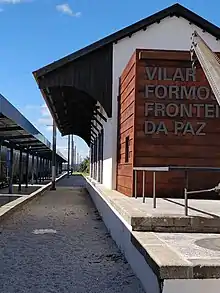
In recent years, thousands of Israelis, as well as Turkish Jews and Brazilian Jews, have been able to prove that they are descended from Jews expelled from Portugal in 1497 and have thus have acquired Portuguese citizenship.[126][127][128] In particular, from 2015 to 2021 56,619 people who claimed Sephardic ancestry were able to obtain Portuguese citizenship.[129] Amongst them, 54,402 or 96.08% didn't live in Portugal. The five most common nationalities of those applying and succeeding in the naturalisation process were:
- Israel: 42,080 Israelis became Portuguese on the ground of their Sephardic heritage; of those naturalising 95.87% or 40,343 didn't live in Portugal at the time of their naturalisation
- Turkey: 5,819 Turks became Portuguese on the ground of their Sephardic heritage; of those naturalising 98.25% or 5,717 didn't live in Portugal at the time of their naturalisation
- Brazil: 4,087 Brazilians became Portuguese on the ground of their Sephardic heritage; of those naturalising 94.47% or 3,861 didn't live in Portugal at the time of their naturalisation
- Argentina: 1,722 Argentines became Portuguese on the ground of their Sephardic heritage; of those naturalising 96.34% or 1,659 didn't live in Portugal at the time of their naturalisation
- United States of America: 551 US citizens became Portuguese on the ground of their Sephardic heritage; of those naturalising 97.28% or 536 didn't live in Portugal at the time of their naturalisation
Nationals of the five said countries naturalising as Portuguese citizens thanks to the 2015 Law totalled 54,259 people or 95.83% of those acquiring Portuguese citizenship due to their Jewish ethnic background up to 2021.
Immigration by investment
Another group of immigrants, especially among Non-European citizens, can avail the chance of residing in Portugal by making a financial investment. RBI (Residency by Investment) schemes, also called "golden visa" or "golden passport", offer Non-European citizens a residency and work permit inside Europe. According to RBI programs operated by a handful of Member States of EU, Non-European citizens can have access to residency or citizenship in exchange for specified investments in the country.
Under Portugal's Golden Visa program, which has been in service since 8 October 2012, the Portuguese government grants a residence permit to those who invest an amount of at least €350,000 which is maintained for at least (a continuous) five years.
Immigration detention
In Portugal, the Ministry of Interior is responsible for immigration matters. The country currently has one officially designated immigration detention centre, Unidade Habitacional de Santo António, located in Porto. Opened in 2006, the centre is managed by the Foreigners and Borders Service (Serviço de Estrangeiros e Fronteiras, SEF).[130]
There are also five Temporary Installation Centres (Centros de Instalação Temporária, CIT) located in each major airport, including that of Porto, Lisbon, Faro, Funchal, and Ponta Delgada. Besides this government-led places, in Lisbon there is the Bobadela reception centre for asylum seekers run by the Portuguese Council for Asylum Seekers (Conselho Português para os Refugiados, CPR) and the Pedro Arupe reception centre managed by the Jesuit Refugee Service.Opposition to immigration
Portugal had little immigration until a sudden influx in the 1970s, as ex-colonists, most of them ethnically white, returned.[131] After the former Portuguese African colonies gained independence, and because nationals of Portuguese-speaking nations can freely live and work in Portugal without much bureaucracy, an incremental growth of immigration from Portugal's former overseas possessions was observed over the past few decades, primarily from Brazil, Cape Verde, Angola and Mozambique.[132][133] The country now has are nearly 240,000 Brazilians[134] and about 350,000 people born in an African country.[135] Although immigrants are mostly concentrated in urban and suburban areas, mainly on Portugal's coast, Portuguese authorities have in recent times encouraged immigration, notably from Brazil, to rural areas, in an effort to increase an ever shrinking population.[136] The growth of the number of immigrants has been linked to an escalation of anti-immigration sentiments and protests throughout Portugal since the mids 2000's.[137][138]
Until recently, far-right party "National Renewal Party", known as PNR, was the only one in Portugal which actively targeted the mass-immigration and ethnic minorities (mainly related to Gypsy and African communities) issues.[139][140] After years of growing support—0.09% 4,712 2002, 0.16% 9,374 2005, 0.20% 11,503 2009, 0.31% 17,548 2011— it managed 0.50%, or 27,269, of the electorate in the 2015 Portuguese legislative election. Since 2019, far-right political party CHEGA! has gained traction in the country. Following the 2019 Portuguese legislative election, the party's president, André Ventura, assured a seat in Assembly of the Republic, after having received over 66,000 votes, 1,3% of the electorate.[141] In the 2020 Azorean regional election, the party secured two assemblyman to the regional parliament[142] and, during the 2021 Portuguese presidential election, André Ventura managed to gather approximately 500,000 votes, 12% of the total.[143] The party has been described as being anti-immigration and xenophobic.[144] CHEGA! has an estimated 28,000 militant members[145] and is expected to continue to rise in popularity and political force.[146]Gallery
Below there are flag maps showing, from left to right, the five most numerous foreign communities present in each Portuguese district as of January the 1st 2022 according to official Portuguese data. These numbers take into account only foreigners - thus excluding Portuguese people of foreign background - who reside legally and permanently in Portugal.[147]
- Flag maps of the five most important foreign communities in each Portuguese district as of 01.01.22
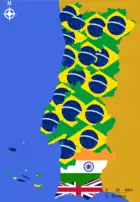
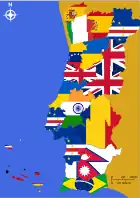 Flag map of the second most common foreign nationality in Portugal in every district. Cape Verdeans are present in Lisbon Area, Italians in Porto while Britons and Romanians in the interior.
Flag map of the second most common foreign nationality in Portugal in every district. Cape Verdeans are present in Lisbon Area, Italians in Porto while Britons and Romanians in the interior.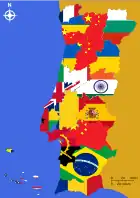 Flag map of the third most common foreign nationality in Portugal in every district. US-citizens are present in the Azores, Chinese in the industrialized north while PALOP citizens in the Lisbon Metropolitan Area
Flag map of the third most common foreign nationality in Portugal in every district. US-citizens are present in the Azores, Chinese in the industrialized north while PALOP citizens in the Lisbon Metropolitan Area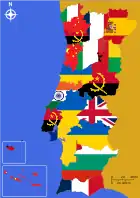 Flag map of the fourth most common foreign nationality in Portugal in every district. Angolans and Eastern Europeans (such as Ukrainians in Santarém) are present nationwide
Flag map of the fourth most common foreign nationality in Portugal in every district. Angolans and Eastern Europeans (such as Ukrainians in Santarém) are present nationwide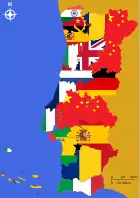 Flag map of the fifth most common foreign nationality in Portugal in every district. One can appreciate the presence of the Chinese near the Spanish border and the prevalence of Europeans along the coast
Flag map of the fifth most common foreign nationality in Portugal in every district. One can appreciate the presence of the Chinese near the Spanish border and the prevalence of Europeans along the coast
See also
References
- "Population on 1 January by age group, sex and country of birth". ec.europa.eu. Retrieved 2 August 2023.
- "Statistics Portugal – Web Portal". www.ine.pt. Retrieved 2 August 2023.
- "661 mil imigrantes, mais 71 mil do que antes da pandemia" (in Portuguese). Diário de Notícias. Retrieved 12 June 2021.
- "Sefstat 2022" (PDF).
- "Acquisition of citizenship by age group, sex and former citizenship".
- "Portal do INE". www.ine.pt. Retrieved 2 August 2023.
- "Portal do INE". www.ine.pt. Retrieved 30 September 2023.
- Correspondente', 'VICENTE NUNES. "Mais de 100 mil brasileiros estão em situação irregular em Portugal". Brasil (in Brazilian Portuguese). Retrieved 2 August 2023.
- "Imigração ilegal | CNN Portugal". cnnportugal.iol.pt (in Portuguese). Retrieved 2 August 2023.
- "Portugal intensifica cerco aos imigrantes ilegais". O Globo (in Brazilian Portuguese). 2 August 2022. Retrieved 2 August 2023.
- "SEF lança operação para regularizar casos de 300 mil imigrantes que estão em espera".
- "Quase 800 mil estrangeiros vivem em Portugal e 30% são brasileiros". www.dn.pt (in European Portuguese). 23 June 2023. Retrieved 2 August 2023.
- "SEFSTAT – Portal de Estatística". sefstat.sef.pt. Retrieved 2 August 2023.
- Pinto, José Volta e (6 May 2021). "Comunidade indiana em Portugal quase quintuplicou em 13 anos". PÚBLICO (in Portuguese). Retrieved 2 August 2023.
- "A aventura de um imigrante indiano no mundo português da habitação". TSF Rádio Notícias (in European Portuguese). 15 February 2023. Retrieved 2 August 2023.
- "Statistics Portugal – Web Portal". www.ine.pt. Retrieved 2 August 2023.
- Campos, Alexandra (12 August 2023). "Um sexto dos bebés nascidos em 2022 em Portugal são filhos de mães estrangeiras". PÚBLICO (in Portuguese). Retrieved 25 August 2023.
- Neves, Sofia (1 January 2023). "Aariz, o primeiro bebé do ano em Portugal, é filho de paquistaneses". PÚBLICO (in Portuguese). Retrieved 25 August 2023.
- Dismantling the Portuguese Empire, Time Magazine (7 July 1975)
- Ferreira, José; Schnoor, Marina; Felizardo, Sérgio (6 March 2019). "À Margem da Lei: a vida no que resta do Bairro 6 de Maio". Vice (in Portuguese). Retrieved 15 July 2023.
- "Bairros de imigrantes africanos demolidos em Lisboa – DW – 09/05/2016". dw.com (in Portuguese). Retrieved 15 July 2023.
- Dupraze, Paule (1999). "Pour une bibliographie des immigrations africaines au Portugal". Lusotopie. 6 (1): 516–525.
- "A Proteção dos Direitos Humanos e as Vítimas de tráfico de Pessoas" (PDF).
- "Taxa de desemprego: total e por sexo (%)". www.pordata.pt. Retrieved 2 August 2023.
- "Taxa de crescimento do PIB". www.pordata.pt. Retrieved 2 August 2023.
- "Taxa de Inflação (Taxa de Variação do Índice de Preços no Consumidor): total e por consumo individual por objetivo". www.pordata.pt. Retrieved 2 August 2023.
- "Emigrantes: total e por tipo e sexo". www.pordata.pt. Retrieved 2 August 2023.
- "Statistics Portugal – Web Portal". www.ine.pt. Retrieved 2 August 2023.
- "Statistics Portugal – Web Portal". www.ine.pt. Retrieved 2 August 2023.
- Victoria Waldersee (15 October 2019), Portugal amends returnee program in bid to attract more citizens home Reuters.
- "Portugal is paying its emigrants to return". World Economic Forum.
- "ARI – Residence permit for investment activity". SEF.pt.
- "Visto Gold" (PDF).
- "Fim dos vistos gold: "Portugal precisa de investimento estrangeiro como de pão para a boca"". SIC Notícias (in Portuguese). 6 April 2023. Retrieved 2 August 2023.
- ECO (6 July 2023). "Parlamento aprova fim de novos vistos gold". ECO (in European Portuguese). Retrieved 2 August 2023.
- "Reação mista ao fim dos vistos Gold em Portugal". euronews (in Portuguese). 14 April 2023. Retrieved 2 August 2023.
- "Regime Fiscal Residente" (PDF).
- "Portugal e Suécia assinam acordo sobre impostos dos pensionistas". www.jornaldenegocios.pt (in European Portuguese). Retrieved 2 August 2023.
- "Suécia perdeu a paciência e quer revogar acordo fiscal com Portugal". www.jornaldenegocios.pt (in European Portuguese). Retrieved 2 August 2023.
- "Regime português para pensionistas estrangeiros é dos mais prejudiciais da UE". www.dn.pt (in European Portuguese). 22 November 2021. Retrieved 2 August 2023.
- ""Flórida da Europa": Portugal atrai reformados ricos e divide europeus". www.jornaldenegocios.pt (in European Portuguese). Retrieved 2 August 2023.
- "Pensionistas estrangeiros podem pedir IRS de 0% até março de 2021". www.jornaldenegocios.pt (in European Portuguese). Retrieved 2 August 2023.
- "Portuguese Law of Return". Retrieved 12 April 2023.
- "Portuguese Law: Sephardic descendants eligible to obtain Portuguese Citizenship – Sponsored Content | The Times of Israel". The Times of Israel. Retrieved 12 April 2023.
- "Getting The Portuguese Citizenship For The Sephardic Jews". Abitbol Associes. Retrieved 12 April 2023.
- "Nationality: Acquisition by Descendants of Sephardic Jews". Embassy of Portugal to the United States of America. Retrieved 12 April 2023.
- Renascença. "Renascença – A par com o mundo". Rádio Renascença (in European Portuguese). Retrieved 12 April 2023.
- Machado, Alexandra. "Mais de 30 mil descendentes de sefarditas receberam cidadania portuguesa desde 2015". Observador (in European Portuguese). Retrieved 12 April 2023.
- Lusa, Agência. "Descendentes sefarditas a viver no estrangeiro foram quem mais obteve a cidadania portuguesa". Observador (in European Portuguese). Retrieved 12 April 2023.
- "Sefarditas de mais de 60 países pediram nacionalidade portuguesa". TSF Rádio Notícias (in European Portuguese). 16 February 2022. Retrieved 12 April 2023.
- Pomerantz, Leandro Da Mota Damasceno, Ian (14 March 2023). "O que aconteceu à "reparação histórica mais progressista" da Europa?". PÚBLICO (in Portuguese). Retrieved 12 April 2023.
{{cite web}}: CS1 maint: multiple names: authors list (link) - Jones, Sam; Silva, Beatriz Ramalho da (16 March 2022). "Portugal to change law under which Roman Abramovich gained citizenship". The Guardian. ISSN 0261-3077. Retrieved 12 April 2023.
- "Les secrets de la ruée sur les passeports portugais". Le Monde.fr (in French). 27 February 2023. Retrieved 12 April 2023.
- "Descendentes de judeus sefarditas correm por nacionalidade em Portugal antes de nova regra". Folha de S.Paulo (in Brazilian Portuguese). 6 May 2022. Retrieved 12 April 2023.
- Santos, Eurico (6 April 2023). "Comunicado do Conselho de Ministros de 6 de abril de 2023". www.homepagejuridica.pt (in European Portuguese). Retrieved 12 April 2023.
- Oliveira, Marta Moitinho (15 April 2023). "Lei dos judeus sefarditas válida até ao final de 2023". PÚBLICO (in Portuguese). Retrieved 2 August 2023.
- ECO (15 April 2023). "Regime atual para descendentes de judeus sefarditas pedirem nacionalidade termina em dezembro". ECO (in European Portuguese). Retrieved 2 August 2023.
- "Unemployment by sex and age – annual data". ec.europa.eu. Retrieved 2 August 2023.
- Lusa, Agência. "SEF prepara resposta para legalizar cerca de 170 mil imigrantes fora do espaço lusófono". Observador (in European Portuguese). Retrieved 3 June 2023.
- "Expresso".
- "2022 bate recorde de novas igrejas, em especial evangélicas e graças aos cidadãos brasileiros". www.dn.pt (in European Portuguese). Retrieved 2 August 2023.
- "Mouraria. No bairro do fado, dos talhos 'halal' e do cheiro a caril, as pessoas vivem em condições "tão miseráveis porque não têm alternativas"". CNN Portugal (in Portuguese). 12 February 2023. Retrieved 2 August 2023.
- Lusa, Agência. "Comunidade do Bangladesh tem cerca 20 infetados em bairro lisboeta". Observador (in European Portuguese). Retrieved 2 August 2023.
- Portugal, Rádio e Televisão de (1 March 2018). ""Bangla em Lisboa". Surpreendente retrato de uma comunidade rendida a Portugal". "Bangla em Lisboa". Surpreendente retrato de uma comunidade rendida a Portugal (in Portuguese). Retrieved 2 August 2023.
- Lusa (15 March 2003). "Martim Moniz: Sampaio visita maior centro comercial inter-étnico". PÚBLICO (in Portuguese). Retrieved 2 August 2023.
- "Foreigners in Portugal-Eurostat". ec.europa.eu. Retrieved 2 August 2023.
- "Sefstat 31 Dezembro 2007" (PDF).
- "Product – Products Datasets – Eurostat". ec.europa.eu. Retrieved 2 August 2023.
- "Sefstat 31 Dezembro 2008" (PDF).
- "Sefstat 31 Dezembro 2009" (PDF).
- "Sefstat 31 Dezembro 2010" (PDF).
- "Sefstat 31 Dezembro 2011" (PDF).
- "Sefstat 31 Dezembro 2012" (PDF).
- "Sefstat 31 Dezembro 2013" (PDF).
- "Sefstat 31 Dezembro 2014" (PDF).
- "Sefstat 31 Dezembro 2015" (PDF).
- "Sefstat 31 Dezembro 2016" (PDF).
- "Sefstat 31 Dezembro 2017" (PDF).
- "Sefstat 31 Dezembro 2018" (PDF).
- "Sefstat 31 Dezembro 2019" (PDF).
- "Sefstat 31 Dezembro 2020" (PDF).
- "Sefstat 31 Dezembro 2021" (PDF).
- "Population on 1 January by age and sex". ec.europa.eu. Retrieved 2 August 2023.
- "Archived copy". Archived from the original on 8 December 2015. Retrieved 3 December 2015.
{{cite web}}: CS1 maint: archived copy as title (link) - "SEFSTAT" (PDF).
- Estatísticas da Imigração (PDF) (in Portuguese), Alto Comissariado para a Imigração e Minorias Étnicas, 2003, archived from the original (PDF) on 14 March 2008, retrieved 14 December 2007
- "SEFSTAT" (PDF).
- Estatísticas da Imigração (PDF) (in Portuguese), Alto Comissariado para a Imigração e Minorias Étnicas, 2005, archived from the original (PDF) on 28 September 2007, retrieved 14 December 2007
- "SEFSTAT" (PDF).
- População Estrangeira em Portugal – 2006 (pdf) (in Portuguese), Instituto Nacional de Estatística, 13 December 2007, retrieved 14 December 2007
- "Eurostat: Acquisition of citizenship in the EU".
- "Eurostat".
- "SEFSTAT – Portal de Estatística". sefstat.sef.pt. Retrieved 31 August 2023.
- "Os novos trabalhadores rurais do Alentejo: entre a esperança e a discriminação". landportal.org (in Portuguese). 2 August 2019. Retrieved 31 August 2023.
- "Como eram os jovens da Cova da Moura: Cabo Verde lá longe". Jornal Expresso (in European Portuguese). Retrieved 27 September 2023.
- "Portugal approves new immigration law". People's Daily Online. Retrieved 13 July 2012.
- "Portugal sees integration progress". BBC. Retrieved 13 July 2012.
- "Russian immigrants in Portugal – miracles and nightmares". Pravda. Retrieved 13 July 2012.
- "Irregular Transit Migration from Moldova". Degruyter. doi:10.1515/9789048523160-010.
- "Ukrainian Migration to Portugal".
- "Deportation of illegal immigrants up 53%". The Portugal News. Retrieved 13 July 2012.
- "Jail terms for employers of illegal immigrants". The Portugal News. Retrieved 13 July 2012.
- "How Spain and Portugal Expelled Their Jews". My Jewish Learning. Retrieved 17 March 2023.
- "Cristãos-novos". Mundo Educação (in Brazilian Portuguese). Retrieved 17 March 2023.
- "Crypto Jews: What is the history of secret Jews? - explainer". The Jerusalem Post | JPost.com. Retrieved 17 March 2023.
- UCL (14 December 2014). "Lisbon and its Jewish refugees: Engaging Portugal with its World War II history". Research Impact. Retrieved 15 October 2023.
- "Lisbon Jewish Community". cilisboa.org. Retrieved 15 October 2023.
- "The Jewish Community of Lisbon - The Portuguese Jewish News". portuguesejewishnews.com. Retrieved 15 October 2023.
- Communications, NYU Web. "The Liminal Life of Jewish Refugees in WWII Portugal—and What it Can Teach Us Today". www.nyu.edu. Retrieved 15 October 2023.
- "Yad Vashem".
- "Portugal finally recognises consul who saved thousands from Holocaust". BBC News. 16 June 2020. Retrieved 15 October 2023.
- "Portugal". United States Department of State. Retrieved 15 October 2023.
- 16th century Jewish refugees can claim Portuguese citizenship, Haaretz, 13 April 2013, archived from the original on 24 October 2013
- "Text of Decree-Law n.º 30-A/2015 of Portugal, 27 February 2015" (PDF). cilisboa.org. Archived from the original (PDF) on 9 November 2017. Retrieved 25 April 2018.
- "Portuguese Nationality for Sephardic Descendants" (PDF). Comunidade Israelita do Porto. Retrieved 26 October 2018.
- Devos, Olivier (16 September 2016). "Amid rising European anti-Semitism, Portugal sees Jewish renaissance". The Times of Israel. Archived from the original on 4 August 2017. Retrieved 3 August 2017.
- Liphshiz, Cnaan (12 February 2016). "New citizenship law has Jews flocking to tiny Portugal city". The Times of Israel. Archived from the original on 15 July 2017. Retrieved 3 August 2017.
- "Portugal open to citizenship applications by descendants of Sephardic Jews". Jewish Telegraphic Agency. 3 March 2015. Archived from the original on 3 August 2017. Retrieved 3 August 2017.
- Liphshiz, Cnaan (24 February 2018). "A soaring number of Jews acquired Portuguese citizenship in 2017". The Times of Israel. Archived from the original on 11 March 2018. Retrieved 22 September 2020.
- "1.800 Sephardic Jews get Portuguese citizenship". European Jewish Congress. 26 February 2018.
- Liphshiz, Cnaan (17 July 2019). "Portugal grants citizenship to 10,000 descendants of Sephardi Jews". The Times of Israel.
- JTA (9 November 2020). "Portugal Naturalizes 23,000 Applicants Under Jewish Law of Return - Jewish Exponent". Jewish Exponent.
- "Portugal has granted Portuguese citizenship to 56,685 descendants of Sephardic Jews". Jewish News Syndicate. 8 February 2022.
- Renascença (20 January 2023). "Registos sem capacidade para dar resposta a mais de 300 mil pedidos de nacionalidade portuguesa - Renascença". Rádio Renascença (in European Portuguese). Retrieved 24 February 2023.
- "Roman Abramovich: Rabbi investigated over Portuguese citizenship". BBC News. 12 March 2022.
- "Amid rising European anti-Semitism, Portugal sees Jewish renaissance". Timesofisrael.com. Retrieved 30 September 2017.
- "New citizenship law has Jews flocking to tiny Portugal city". Timesofisrael.com. Retrieved 30 September 2017.
- "Portugal open to citizenship applications by descendants of Sephardic Jews". Jta.org. 3 March 2015. Retrieved 30 September 2017.
- "Portal do INE". www.ine.pt. Retrieved 15 October 2023.
- Portugal Detention Profile Archived 4 September 2010 at the Wayback Machine. Global Detention Project. Retrieved 8 February 2010
- Peralta, Elsa (2019). "A integração dos retornados: identidade, desidentificação e ocultação" (PDF). Instituto de Ciências Sociais da Universidade de Lisboa. (in European Portuguese).
- "AFRODESCENDENTES EM PORTUGAL". Revista do Observatório das Migrações (in European Portuguese). December 2019.
- "Cidadãos de países da CPLP vão ter autorizações de residência em 72 horas". Público (in European Portuguese). March 2023.
- "Quase 800 mil estrangeiros vivem em Portugal e 30% são brasileiros". Público (in European Portuguese). June 2023.
- "População residente de naturalidade estrangeira segundo os Censos: total e por país de naturalidade". Pordata (in European Portuguese).
- Amato, Gian (14 December 2020). "'Há qualidade de vida no interior de Portugal, faltam pessoas. É o momento de os brasileiros virem', diz ministra do país". O Globo (in European Portuguese).
- Rattner, Jair (18 June 2005). "Portugueses fazem protesto em Lisboa contra imigrantes e violência". Folha (in European Portuguese).
- Carlos, João (20 August 2020). "Ataques racistas preocupam imigrantes africanos em Portugal". DW (in European Portuguese).
- Gomes, Joaquim (1 December 2018). "Líder do PNR contra "marxismo cultural que captura o pensamento"". Sapo (in European Portuguese).
- Henriques, Joana (13 July 2018). "Boicote do PNR a protesto anti-racista vigiado pela PSP". Publico (in European Portuguese).
- Jorge, Catarina (7 October 2019). "O Chega elegeu um deputado e promete ser "o maior partido daqui a 8 anos"". Observador (in European Portuguese). Retrieved 20 February 2021.
- "Eleições nos Açores: Chega elege dois deputados". Publico (in European Portuguese). 7 October 2019. Retrieved 20 February 2021.
- "Portugal's centre-right president re-elected but far right gains ground". The Guardian. 25 January 2021. Retrieved 21 January 2021.
- "Is the far-right gaining popularity in Portugal?". Euronews. 25 January 2021. Retrieved 20 February 2021.
- Figueiredo, Inês André (10 March 2021). "Só um em cada cinco militantes do Chega inscritos nos cadernos eleitorais votou em Ventura". Observador (in European Portuguese). Retrieved 20 February 2021.
- Cotrim, António (21 December 2020). "Sondagem legislativas. Chega passa a terceira força e Bloco cai". Publico (in European Portuguese). Retrieved 20 February 2021.
- "SEFSTAT – Portal de Estatística". sefstat.sef.pt. Retrieved 25 August 2023.
.jpg.webp)
_-_15597425967.jpg.webp)


.jpg.webp)
.jpg.webp)
.jpg.webp)
.jpg.webp)
